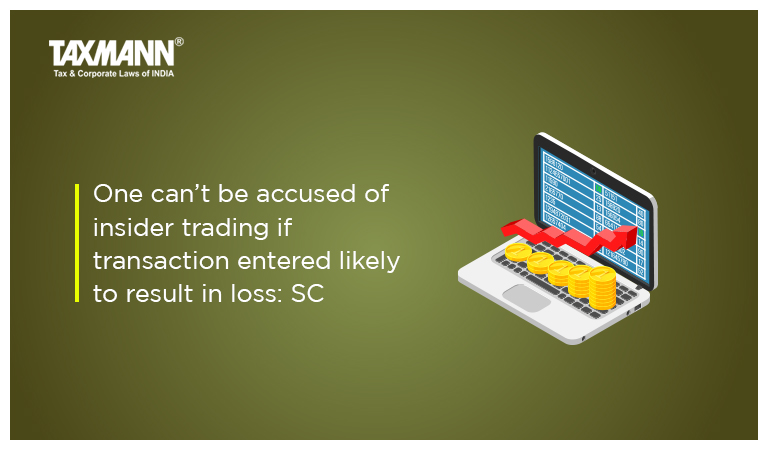One can’t be accused of insider trading if transaction entered likely to result in loss: SC
- Blog|News|Company Law|
- 3 Min Read
- By Taxmann
- |
- Last Updated on 21 September, 2022

Case Details: Securities and Exchange Board of India v. Abhijit Rajan - [2022] 142 taxmann.com 373 (SC)
Judiciary and Counsel Details
-
- Indira Banerjee & V. Ramasubramanian, JJ.
Facts of the Case
In the instant case, the question arose before the Supreme Court whether one can be accused of insider trading if transaction entered into by him is surely likely to result in loss or not?
An appeal was filed against the order of the Securities Appellate Tribunal (SAT) whereby the order of a Whole Time Member (WTM) of SEBI directing the respondent to disgorge the amount of unlawful gains made by him was set aside.
The respondent was the Chairman and Managing Director of the company – Gammon Infrastructure Projects Limited (GIPL). GIPL was awarded a contract for the execution of a project, whose total cost was admittedly Rs. 1648 crores. Similarly, another company Simplex Infrastructure Limited (SIL) was awarded a contract for a project whose cost was Rs. 940 crores.
Both GIPL and SIL created Special Purpose Vehicles and then they entered into two shareholders Agreements. Under these Agreements, GIPL and SIL will have to make investments in the Special Purpose Vehicles created by each other, in such a manner that each of them will hold 49% equity interest in the other’s project.
However, the Board of Directors of GIPL passed a resolution authorising termination of both shareholder agreements. The respondent sold about 144 lakhs shares (approx.) held by him in GIPL, for an aggregate value of approximately Rs 10.28 crores. Therefore, the cancellation of the shareholder’s agreements resulted in GIPL gaining very hugely in terms of order book value.
The SEBI passed an ex-parte interim order holding prima facie that the respondent violated the provisions of sections 12A(d) and (e) of the SEBI Act, 1992. Consequently, restrained the respondent from buying, selling or dealing in securities.
In addition to this, the WTM passed an order whereby the respondent was held guilty of insider trading and also held liable to disgorge the amount of unlawful gains to the tune of Rs. 1.09 crores.
The respondent filed an appeal before the SAT. The respondent contended that he had to dispose of his shares as well as certain other properties for the purpose of honouring a CDR package. Further, it was on record that if the CDR package had not gone through successfully, the parent company of GIPL namely, Gammon India Ltd., could have gone into bankruptcy.
The SAT allowed the appeal. Thereafter, an appeal was made to the Supreme Court against the order passed by the WTM of SEBI.
Supreme Court Held
The Supreme Court held that the sale by a person at a time when the price of the securities is likely to shoot up on account of price sensitive information coming into the public domain or the purchase by a person at a time when the price of the shares is likely to go downward due to price sensitive information getting published, cannot come under the category of “insider trading”.
Further, if a person enters into a transaction which is surely likely to result in loss, he cannot be accused of insider trading. In other words, the actual gain or loss is immaterial, however, the motive for making a gain is essential. The words, “likely to materially affect the price” appearing in the main part of Regulation 2(ha) of the SEBI (Prohibition of Insider Trading) Regulations, 1992 gain significance for the simple reason that profit motive should be the motivating factor for a person to indulge in insider trading.
In view of the above, the Court concluded that one can’t be accused of insider trading if transaction entered into by him is surely likely to result in loss.
Disclaimer: The content/information published on the website is only for general information of the user and shall not be construed as legal advice. While the Taxmann has exercised reasonable efforts to ensure the veracity of information/content published, Taxmann shall be under no liability in any manner whatsoever for incorrect information, if any.

Taxmann Publications has a dedicated in-house Research & Editorial Team. This team consists of a team of Chartered Accountants, Company Secretaries, and Lawyers. This team works under the guidance and supervision of editor-in-chief Mr Rakesh Bhargava.
The Research and Editorial Team is responsible for developing reliable and accurate content for the readers. The team follows the six-sigma approach to achieve the benchmark of zero error in its publications and research platforms. The team ensures that the following publication guidelines are thoroughly followed while developing the content:
- The statutory material is obtained only from the authorized and reliable sources
- All the latest developments in the judicial and legislative fields are covered
- Prepare the analytical write-ups on current, controversial, and important issues to help the readers to understand the concept and its implications
- Every content published by Taxmann is complete, accurate and lucid
- All evidence-based statements are supported with proper reference to Section, Circular No., Notification No. or citations
- The golden rules of grammar, style and consistency are thoroughly followed
- Font and size that’s easy to read and remain consistent across all imprint and digital publications are applied



 CA | CS | CMA
CA | CS | CMA
